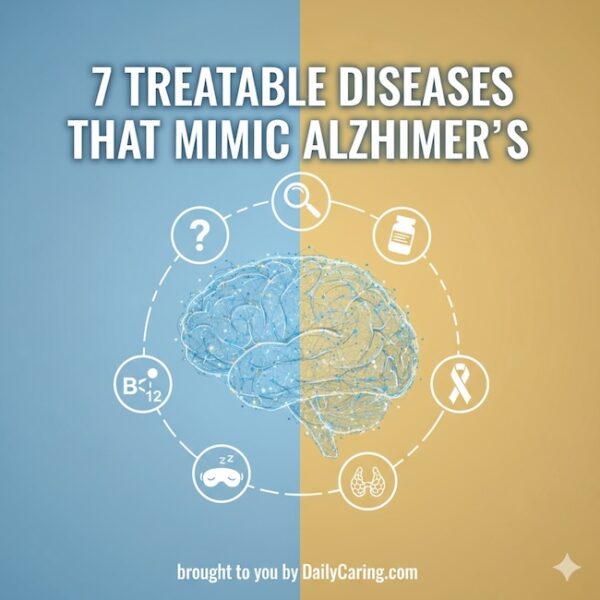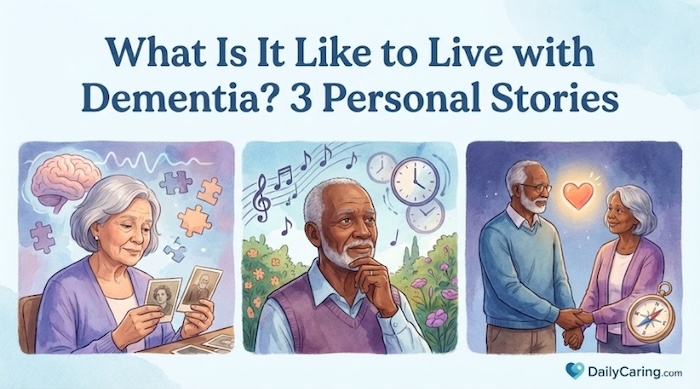When an older adult shows signs of memory loss, confusion, or personality changes, it's natural to fear the worst. But before you assume it's Alzheimer's or another form of dementia, it's crucial to hit the pause button.

What looks like a permanent cognitive decline can sometimes be a clever and reversible mask worn by a completely treatable health issue. Identifying the actual cause of these symptoms can be crucial in restoring your loved one's clarity and well-being.
Here are seven common health conditions that mimic dementia, proving that a symptom isn't always what it seems.
Don’t Assume Unusual Behavior is Caused by Alzheimer's
If an older adult’s behavior changes, it’s normal to be worried.
And there’s often a tendency to jump to the conclusion that it’s caused by Alzheimer’s disease or dementia.
However, before making any assumptions, it’s essential to identify the actual cause of the problem.
That's because many treatable medical conditions cause dementia-like symptoms. So if your loved one suddenly starts behaving unusually, take them to the doctor to get checked out.
Please don’t assume that they don’t need to see a doctor because there’s no cure for dementia. A treatable condition could cause their symptoms.
Also, if their behavioral symptoms start suddenly, that’s a sign it’s probably not dementia—both Alzheimer’s disease and dementia progress gradually over the years.
Here, we share seven common diseases that mimic Alzheimer’s by causing alarming cognitive changes.
Being aware of these conditions helps you advocate for your older adult and enables them to receive proper treatment.

7 Treatable Diseases That Mimic Alzheimer’s
These seven health conditions often cause symptoms similar to Alzheimer's or dementia in older adults.
Once these conditions are diagnosed and properly treated, the troubling symptoms are usually eliminated.
1. Urinary tract infection (UTI)
Seniors are the most likely group of people to develop a urinary tract infection (UTI), a condition that can be easily treated with antibiotics.
They’re also the least likely to have typical symptoms like pain during urination, fever, or a frequent urge to go.
Instead, UTI symptoms often show up as a sudden change in behavior. Someone who suddenly can’t remember a significant event from last week might have a UTI.
Other signs of an infection include:
- Falls
- Recent incontinence
- Loss of appetite
- Agitation
- Restlessness
- Difficulty concentrating
- Hallucinations
- Delusions
- Becoming unusually sleepy or withdrawn
2. Medication Side Effects
Medications called anticholinergics are commonly used by older adults (pronounced anti-col-in-er-jik; click to hear).
These drugs and their side effects can cause dementia-like symptoms in people without previous cognitive issues.
That's because anticholinergic drugs block brain chemicals involved in learning, memory, and muscle function.
Older adults already have less of these key brain chemicals because their bodies produce less of them as they age. And blocking them with drugs makes it even harder for the brain to function correctly.
Ask the doctor to review all medications and supplements.
But DON'T start, stop, or change dosage for any medications without first talking with the doctor – that could be dangerous.
3. Hospitalization and Anesthesia
Being hospitalized or undergoing surgery with anesthesia can cause older adults to develop delirium. My own father experienced this after surgery for a fractured hip.
People with delirium can have terrifying hallucinations or delusions. Some become agitated and combative, while others are sleepy and struggle to pay attention.
Dementia develops slowly, but delirium starts suddenly.
Delirium can be triggered by treatments that older adults are susceptible to, like large doses of anti-anxiety drugs and narcotics.
At other times, it’s caused by noisy, brightly lit environments where sleep is interrupted and staff keep changing – in other words, a typical hospital room.
It’s essential to know about delirium because in older patients, it’s often misdiagnosed as dementia.
If that happens, they won’t receive the proper treatment, and the symptoms won’t subside on their own.
4. Head Trauma
According to the Centers for Disease Control and Prevention (CDC), more than one in four people aged 65 and older fall each year. And falling once doubles the chance of falling again.
These falls may seem minor, but head injuries can cause significant cognitive problems.
If a subdural hematoma forms (a bleed inside the skull), it can interfere with cognitive function.
If your senior has fallen recently and is now exhibiting unusual behavior, they should be evaluated by a doctor as soon as possible.
VIDEO: Seven Treatable Diseases that Mimic Alzheimer's
5. Normal Pressure Hydrocephalus (NPH)
Normal pressure hydrocephalus (NPH) occurs when spinal fluid accumulates in the brain, leading to swelling and increased pressure that affects cognitive function.
If left untreated, this fluid buildup can damage the brain. But once the fluid is drained away, most people return to their normal cognitive abilities.
NPH primarily affects seniors. In most cases, it happens without an apparent cause. It can also be caused by head trauma, brain hemorrhage, or meningitis.
In addition to developing dementia-like symptoms, people with NPH could lose bladder control or walk like their feet were stuck to the floor.
If the doctor suspects NPH, a specialist should be consulted as soon as possible. The sooner it’s treated, the more likely it is that an older adult will return to full cognitive function.
6. Depression
Older adults are more vulnerable to depression, which affects 1 in 10 people over 65 years of age.
This can cause confusion, fatigue, and even memory problems. To family, this might look like symptoms of dementia.
Depression isn't something they can snap out of, but it can be treated successfully with medication, regular exercise, or cognitive therapy and stress-reduction techniques like meditation, yoga, or prayer.
7. Vitamin Deficiency
Vitamin deficiencies can cause symptoms similar to dementia, especially Vitamin B12 deficiency.
This can happen because older people tend to absorb vitamins less efficiently.
A Vitamin B12 deficiency can cause cognitive issues, even if the deficiency isn’t enough to cause anemia.
Other B vitamin deficiencies could also cause dementia-like symptoms, especially if the senior drinks a lot of alcohol or if they’re not eating nutritiously.
With thorough exams and tests, doctors should be able to detect significant vitamin deficiencies and provide appropriate treatment.
Final Thoughts
The journey to a precise diagnosis can be daunting, but this list of seven treatable conditions serves as a potent reminder: not every cognitive symptom points to an irreversible path. It underscores the profound importance of thorough medical investigation.
If you notice concerning changes in yourself or a loved one, let this knowledge empower you to advocate for a comprehensive check-up. By pursuing every possible cause, you open the door to potentially transformative treatments that could restore clarity and significantly improve the quality of life.
Remember, in the quest for answers, identifying a treatable condition is the most hopeful discovery of all.
Next Step: Find out about 8 other common health conditions that also cause dementia-like symptoms
Recommended for you:
- 8 Treatable Diseases That Mimic Dementia
- Is It Alzheimer’s or a Urinary Tract Infection?
- Delirium Is Often Mistaken for Dementia: Know the Signs
About the Author

Connie is the founder of DailyCaring.com and was a hands-on caregiver for her grandmother for 20 years. (Grandma made it to 101 years old!) She knows how challenging, overwhelming, and all-consuming caring for an older adult can be. She also understands the importance of support, especially in the form of practical solutions, valuable resources, and self-care tips.














I am new to this group. Thank you so much for the valuable information posted. This helps me so much. My husband has Parkinsonism with Lewy Body Dementia and was diagnosed 2019. All the different phases he has gone through has been hard to understand and this information is so helpful.
Thank you again,
Ellen
We’re so glad our articles are helpful! Here are some additional articles that might be useful:
– What Is Lewy Body Dementia? 5 Main Symptoms https://dailycaring.com/what-is-lewy-body-dementia-5-main-symptoms/
– 10 Non-drug Ways to Manage Lewy Body Dementia Symptoms https://dailycaring.com/10-non-drug-ways-to-manage-lewy-body-dementia-symptoms/
– How Parkinson’s Disease and Dementia Are Related https://dailycaring.com/the-relationship-between-parkinsons-disease-and-dementia/
– Caring for Someone with Parkinson’s Disease: Key Facts and Helpful Tips https://dailycaring.com/caring-for-someone-with-parkinsons-disease-key-facts-and-helpful-tips/
Thanks for this article!
I know dementia (especially Alzheimer’s) is very common, but not every case of confusion and memory loss in seniors is caused by it. It’s easy to get freaked out by researching this topic online when someone you love has mood/memory changes. Hoping and praying that my mom’s issues are caused by a reversible condition like the ones listed here.
I’m so glad this is helpful! There’s so much focus on Alzheimer’s and dementia it can be easy to forget that there can be other causes for those types of symptoms.
Re: Normal Pressure Hydrocephalus (NPH)
It is urgent that we understand that symptoms of NPH begin with altered gait/ “magnetic foot”, and incontinence. These can be reversed for a time by inserting a shunt after an easy spinal tap. Dementia like symptoms cannot be reversed.
Since this illness is said to be very underdiagnosed it is important to note gait changes asap & help your physician connect it to the possibility of NPH. There are now helpful websites.
Thanks for sharing! Johns Hopkins Medicine has helpful information on symptoms, diagnosis, treatment, and complications of Normal Pressure Hydrocephalus (NPH) here – https://www.hopkinsmedicine.org/health/conditions-and-diseases/hydrocephalus/normal-pressure-hydrocephalus